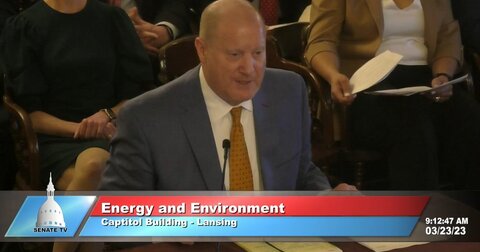Michigan senators question DTE profits, state regulatory power
For a second straight week, Michigan lawmakers question whether DTE’s profits come at the cost of reliability
Michigan lawmakers criticized profits and executive compensation at DTE Energy for a second straight week Thursday, demanding to know why the the utility struggles with reliability while charging high rates to customers.
DTE and Consumers Energy are Michigan’s monopoly utilities, covering 90% of Michigan homes and businesses between them.
After consecutive mass power outages in late February and early March, lawmakers have scrutinized DTE and its practices. Lawmakers also question whether the Michigan Public Service Commission, the state’s energy regulator, has all the power it needs to ensure energy reliability.
With each passing week, the questions grow more pointed, as lawmakers ponder whether the company’s profits are out of whack with its performance. DTE posted a profit of $1.1 billion in 2022.
DTE switched most customers to mandatory peak-hour pricing on March 1. Peak-hour energy prices in the summer will approach California levels.
Top DTE executives earn salaries in the millions. Michigan lawmakers are beginning to question whether these funds come at the expense of investments in energy reliability.
“In the 70s Lee Iacocca, who was the president of Chrysler, decided not to take any salary or bonuses and put it back into the company,” Rep. Helena Scott, chair of the House Energy Committee, said to conclude last week’s hearing.
Iacocca famously reduced his pay as Chrysler CEO to $1 in September 1979. United Press International described Iacocca’s pay cut as his way “to dramatize the company's survival efforts.” It was restored a year later, in Sept. 1980.
That line of questioning continued Thursday at the Senate Energy and Environment Committee.
“Your company makes $1 billion in profits per year. Your CEO makes over $10 million a year,” Sen. Sue Shink, D-Ann Arbor, said during testimony by DTE President Trevor Lauer. “You recently put in a request for the largest rate increase in state history, about $622 million. You regularly have a return on equity which is about 10%. Would you be willing to reduce that rate of return to invest in more reliability?”
Another state senator suggested using government force to reduce the company’s profits.
“Is there a way we can redirect, whether with you or with the laws, to make sure that their profitability isn't so grotesque?” Sen. Rosemary Bayer asked Dan Scripps, chairman of the state’s energy regulator, the Michigan Public Service Commission.
Bayer noted that DTE spent $163 million trimming trees in a year when it posted $1 billion in profits.
“That’s seven times what they spent trying to build reliability into the system.” Bayer said.
Scripps noted that by law, the public service commission cannot make management decisions for the utility companies, such as how much money to spend on tree-trimming. Nor can it force companies to stick to their stated maintenance plans.
“Do you need to change something, or do we need to change the laws?” Bayer asked.
Last week, Rep. Scott ended the House hearing by announcing the creation of a “work group” to study and eventually make policy on energy reliability issues in Michigan. That discussion did not continue at the Senate hearing Thursday.
Michigan Capitol Confidential is the news source produced by the Mackinac Center for Public Policy. Michigan Capitol Confidential reports with a free-market news perspective.

